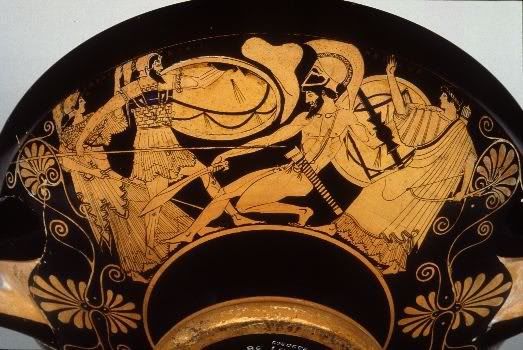 In the book Iliad by Homer, the confrontation between Hector and Aias transpired upon the will of the deities Apollo and Athena. Athena could not stand seeing the Danaans falling in the battle; however, Apollo would not allow Athena to cause another foul play in favor of the Danaans. Apollo came to see Athena by the oak tree, and there he expressed his intention. The deities resolved to stop the war on that day. For the sake of it, they coaxed Hector to challenge any potent champion in the Achaian party to fight him in a single formal battle. The Achaians had made a discussion first, until Aias stood up to face Hector. There had been an exchange of words between Hector and Aias before they finally started the fight. Aias almost killed Hector when he fell on his, but Apollo intervened to get Hector on his feet again. Two heralds came to tell both warriors enough as the night has come. Hector and Aias heeded the heralds’ message, and ended up expressing admiration and exchanging gifts for one another.
In the book Iliad by Homer, the confrontation between Hector and Aias transpired upon the will of the deities Apollo and Athena. Athena could not stand seeing the Danaans falling in the battle; however, Apollo would not allow Athena to cause another foul play in favor of the Danaans. Apollo came to see Athena by the oak tree, and there he expressed his intention. The deities resolved to stop the war on that day. For the sake of it, they coaxed Hector to challenge any potent champion in the Achaian party to fight him in a single formal battle. The Achaians had made a discussion first, until Aias stood up to face Hector. There had been an exchange of words between Hector and Aias before they finally started the fight. Aias almost killed Hector when he fell on his, but Apollo intervened to get Hector on his feet again. Two heralds came to tell both warriors enough as the night has come. Hector and Aias heeded the heralds’ message, and ended up expressing admiration and exchanging gifts for one another. However, the film Troy showed this scene differently. Some situations in the film were omitted such as the involvement of the deities Apollo and Athena, and the challenge made by Hector. The coming of two heralds and the exchange of gifts and admirations were not also presented. In the movie, Hector was mounted on horse when he approached Aias. Many were also fighting at the same time; unlike in the book, the armies stopped and watched Hector and Aias in a duel. In the movie Hector killed Aias; while in the book, they only stopped fighting because of nightfall.
However, the film Troy showed this scene differently. Some situations in the film were omitted such as the involvement of the deities Apollo and Athena, and the challenge made by Hector. The coming of two heralds and the exchange of gifts and admirations were not also presented. In the movie, Hector was mounted on horse when he approached Aias. Many were also fighting at the same time; unlike in the book, the armies stopped and watched Hector and Aias in a duel. In the movie Hector killed Aias; while in the book, they only stopped fighting because of nightfall.As I know, Troy is only an adaptation from the book, but it does not mean that the film should really be consistent with the book. I believe that the writer of the film has all the right to present the Trojan War in a different perspective, away from the mythical side of the book. Perhaps, he just wanted the battle to be realistic, without the deities participating and manipulating the situations. In real life, you do not see gods and goddesses taking people out of their troubles, granting them exceptional strength and determination, nor warriors fighting everyday not killing each other. The movie is probably closer to what really happened in the Trojan War.
On the whole, both book and film were only products of what we call oral tradition, a story passed on to generations after generations, a story which is likely to change. It has been so many years since the Trojan War and its story may have evolved, but the story presented in the movie Troy will always be a portion of the traditional cycle of the epic-myth Iliad.
If I were Homer, I would not care if they made a different adaptation of the story I have written, especially Troy. Besides, filmmakers nowadays would not only base their movie on a single book. Filmmakers should also source from other materials like history books.






